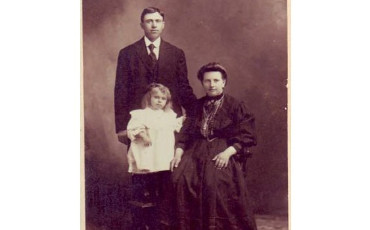Farming life in the 1920s

By FREDERICK LEO WELK
As told to his son, Frederick Jr.
The origin of the surname Welk is given in various name history sources as meaning “foreigner” or “wanderer.” For hundreds of years that has been an apt label for many members of the clan, who ranged from Alsace to Southern Russia then to Dakota always looking for a better place and better times My father lived until 2013, a few months short of his 100th birthday. He frequently commented on having lived from the "horse and buggy days to the computer age."
The children my father's family in North Dakota having become "town kids" were expected to speak English in public. They also answered their parents in English instead of German. His father, Frank Welk, taught himself English, in part, with the help of an English-German dictionary that he kept on his desk. He spoke English with hardly any German accent, my dad recalls. His father would often translate letters for the "country folks" who spoke only German.
Katherine Welk, having never attended school and only just able to write her name, had a wonderful memory. My father believes this was because her learning was focused on ways unsupported by reading and writing. She had a tremendous physical capacity and relatives and friends often admired her ability to "work like a man."
Frank and Katherine Welk with first child, Barbara, later Barbara Sitter of Rugby, ND.
“As we say, we were prosperous as all farmers were at the time. These were the days of the horse and wagons. They’d bring in a load of grain about 60 bushels in a wagon with a team of horses Farmers had their kids 10- 12- 14-years-old driving the team and bringing it to the elevators. And during harvest time there would be just loads and long lines of traffic waiting for a chance to unload there. And Dad would have to take care of it. He would check the grain and would elevate it. In his spare time, he would move it into a box car and send it off to Minneapolis or to Duluth. And it was shipped off into foreign countries.
“Anyway, that’s the way it was done at harvest time done by hard work, horses and wagons. We would farm it. In the spring of the year, we would plow it. We would wait until the frost got out of the ground then we’d take horses and have them pull the plows. Those days we’d have a triple plow. They would turn it over. After that we’d have a drill. It was about 10 feet long with grain in the drill. And we’d set it for how many grains would fall out as the wheels went around. And we’d go up and down the fields, usually 40 acres, 60 acres, 80 acres. Now Dad was intelligent, and we farmed about 1,000 acres. Between us three boys we did all the farming for him as we grew up. And we would wait for rain. Rain was the main thing. Then came what you would call the Depression. There was no rain. You would seed your ground, and nothing would happen. And it all died up and nothing would happen."






